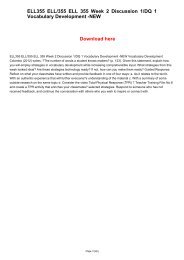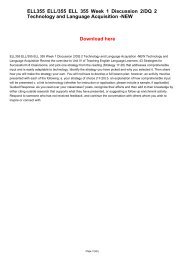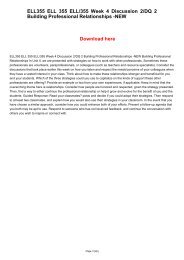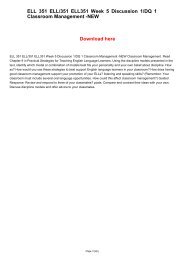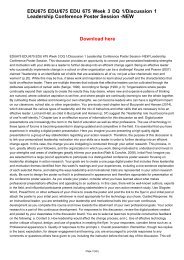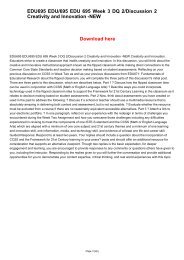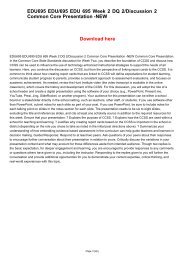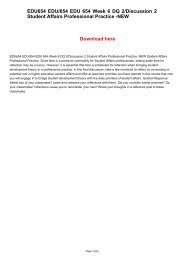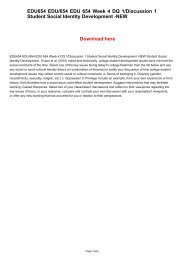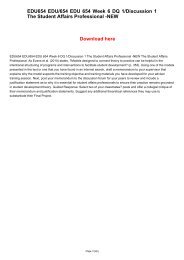EDU 490 EDU490 EDU/490 Week 5 Discussion 1/DQ 1 Joseph Hanson -NEW
EDU 490 EDU490 EDU/490 Week 5 Discussion 1/DQ 1 Joseph Hanson -NEW
EDU 490 EDU490 EDU/490 Week 5 Discussion 1/DQ 1 Joseph Hanson -NEW
Create successful ePaper yourself
Turn your PDF publications into a flip-book with our unique Google optimized e-Paper software.
<strong>EDU</strong> <strong>490</strong> <strong>EDU</strong>/<strong>490</strong> <strong>EDU</strong><strong>490</strong> <strong>Week</strong> 5 <strong>Discussion</strong> 1/<strong>DQ</strong> 1<br />
<strong>Joseph</strong> <strong>Hanson</strong> -<strong>NEW</strong><br />
Download here<br />
<strong>EDU</strong> <strong>490</strong> <strong>EDU</strong>/<strong>490</strong> <strong>EDU</strong><strong>490</strong> <strong>Week</strong> 5 <strong>Discussion</strong> 1/<strong>DQ</strong> 1 <strong>Joseph</strong> <strong>Hanson</strong> -<strong>NEW</strong> <strong>Joseph</strong> <strong>Hanson</strong>. In Chapter Five of your<br />
textbook, you should have engaged in what we know about learning. One of the most powerful ways to demonstrate<br />
your knowledge of these concepts is to apply them in a real life setting. Please read the case study below and answer<br />
the questions in this forum. Overview <strong>Joseph</strong> <strong>Hanson</strong> lives in a small community in southern California with a school<br />
district that serves approximately 4800 students. He is a parent of two boys and one girl. His oldest son is academically<br />
gifted and filled with a love of learning that?s evident regardless of who his teacher has been along the way. His<br />
daughter is academically satisfactory but has found great success as a three sport athlete in high school. While she has<br />
yet to connect with her teachers in a way that challenges her, the coaches in all three of her sports have acted as terrific<br />
mentors as they encourage her to pursue athletics at the college level. <strong>Joseph</strong> has been pleased with the success of his<br />
oldest son and daughter, but his concerns and energy have been focused on his youngest son Kyle. Along with his wife<br />
he has been actively engaged in his education and has worked diligently to support the educational progress of all<br />
students as they volunteers on a weekly basis at school. <strong>Joseph</strong> and his wife had hoped that their presence on campus<br />
would allow them to develop meaningful partnerships with the staff in a way that would lead to better support for Kyle,<br />
but unfortunately that has not been the case. Problem Kyle, while struggling academically, would not be a student that<br />
you might classify as ?special needs.? Because of this, he has not qualified for any special interventions. All of his<br />
teachers have felt that he is the cusp of proficiency and will most likely make it. The problem is that he never does. He is<br />
the classic case of a sub-satisfactory student academically that masquerades as ?proficient?. After numerous appeals to<br />
support Kyle and students like him are ignored, <strong>Joseph</strong> decides to attend a school board meeting in search of answers.<br />
Upon attending the school board meeting, <strong>Joseph</strong> receives a copy of the district?s strategic plan. He reads about the<br />
priorities to support gifted students in gaining scholarships to college, and plans to improve all athletic facilities in a way<br />
that ?can make our town proud!? As the board meeting gets underway, the agenda that has been advertised to the<br />
community focusing on the new district?s bullying policy and data driven intervention plan, has now been replaced with<br />
a single topic agenda dedicated to approving the new salary increase for all district staff members. <strong>Joseph</strong> leaves the<br />
meeting appalled. He goes out in search of answers to questions like: 1. How are citizens with no understanding about<br />
education elected in the first place? 2. What is expected to take place at a board meeting and how much can a citizen<br />
expect to be accomplished by a district whose board meets once a month? 3. What steps can a parent take to be a part<br />
of school-wide solutions at the site level? After participating on a school site council for a year, <strong>Joseph</strong> has decided that<br />
his role on the council is simply to approve budgets that the principal and district were supportive of in the first place.<br />
Because of his lack of fulfillment in the process, he decides to run for the school board. His positive spirit resonates with<br />
the community as the vast majority of the voters select him as the newest member of the board of five. From the<br />
beginning of his term in office, <strong>Joseph</strong>?s proposals to his colleagues as well as district office personnel appeared to be<br />
ignored. His suggestions about how to offer more autonomy to the seven schools within his district are replaced with<br />
ideas on how to mandate uniform steps to ensure that all teachers within each school are participating in the same<br />
curriculum that are aligned to state standards. In spite of the data that shows that this approach has not worked for the<br />
last 15 years, the subjective opinions of the rest of the board always win over. It hasn?t taken long for him to notice that<br />
there are no specific methods for how decisions are made by the board, and he is surprised at how willing the<br />
superintendent is to go along with the recommendations of the elected officials. During a private conversation over<br />
breakfast, the superintendent confides in <strong>Joseph</strong> about his frustration with the board. He shares of the progressive ideas<br />
that he has for the district and about the steps that he wants to take to develop exceptional success for every student.<br />
Finally, this well educated superintendent with a doctorate degree shares that he is considering leaving the district in<br />
search of a venue that might allow him to be more progressive and move beyond the small town politics that are<br />
encouraging mediocrity. He shares about his exhaustion in dealing with the day to day scandals, complaints, and politics<br />
Page 1/{nb}
of education. He, like <strong>Joseph</strong>, wants to be a part of a community in search of better ways to support their neediest<br />
students through approaches that are focused on data and results. Designing a Solution Try to come up with a solution<br />
for <strong>Joseph</strong> by answering the following questions: 1. What issues at the board and district level appear to be evident at<br />
the site level as well? Why is this the case? 2. What are the key issues that are impeding the success that both <strong>Joseph</strong><br />
and the Superintendent want for their community? 3. Because this board is absent of any systems that guide their<br />
decision making, what protocols might you set up immediately? 4. Which stakeholders might you bring into the mix in an<br />
effort to both generate and implement forward thinking solutions for the district? 5. If you were <strong>Joseph</strong>, how would you<br />
respond to the superintendent?s frustration and consideration to leave the district? Guided response: Respond to at<br />
least two classmates. Think back to the learning module you interacted with pertaining to Paul and Elder?s essential<br />
elements of thought and apply some of what you learned in this discussion. For example, when you respond to your<br />
peer?s analysis of this case study ask them to clarify their purpose behind what they write, consider alternative<br />
perspectives, examine their assumptions, and support their thinking with evidence, facts, and research.<br />
Page 2/{nb}





